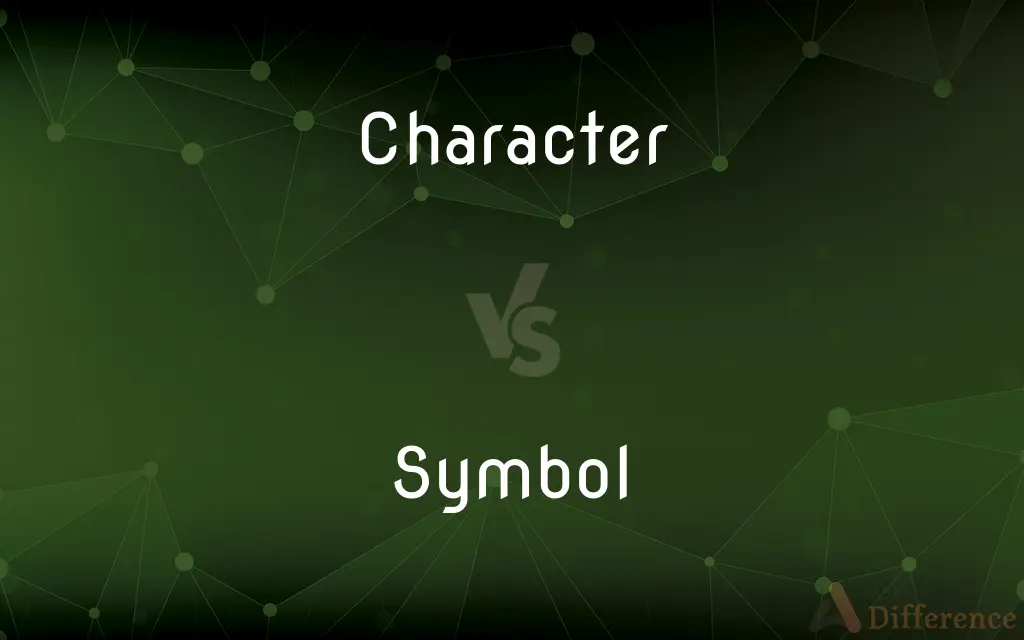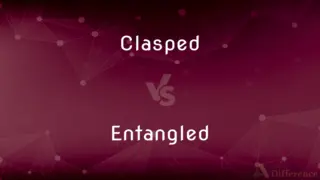Character vs. Symbol — What's the Difference?
Edited by Tayyaba Rehman — By Maham Liaqat — Updated on March 28, 2024
Character often denotes a letter or number, used to create words and sentences, whereas a symbol represents ideas, concepts, or objects.

Difference Between Character and Symbol
Table of Contents
ADVERTISEMENT
Key Differences
Characters are fundamental elements of written language, including letters, numbers, and punctuation marks, forming words and sentences. Whereas symbols are visual or textual elements that stand for or represent an idea, concept, or other abstractions. For instance, the character "A" is used in forming words, while the symbol "&" represents the conjunction "and."
Characters are defined within specific language systems and follow grammatical rules, contributing to the structure of language. On the other hand, symbols transcend language barriers, conveying meanings that are understood beyond the confines of any single language. The heart symbol (♥), for example, universally represents love.
In computing and digital communication, characters are encoded using standards like ASCII and Unicode, which assign a unique code to each character. Whereas symbols may also be encoded but are often used in contexts where they convey specific functions or meanings, such as mathematical symbols (∑ for summation) or emoticons (:-) representing emotions.
While characters are often combined to form words with specific meanings, symbols can stand alone, conveying complex ideas or associations without the need for additional context. For example, national flags are symbols that represent countries and their ideals.
Characters and symbols both play crucial roles in communication. Characters are the building blocks of written language, while symbols provide a means to convey complex ideas, emotions, and cultural meanings efficiently and universally.
ADVERTISEMENT
Comparison Chart
Definition
A letter, digit, or punctuation mark used in writing or printing.
A mark or sign used to represent an object, function, or process.
Role in Language
Constructs words and sentences.
Represents ideas, concepts, or relationships.
Examples
"a", "1", "?"
"@", "♥", "="
Representation
Specific to language systems and follows grammatical rules.
Transcends language, often universally understood.
Usage in Computing
Encoded using standards like ASCII or Unicode.
Used for specific functions or to convey meanings.
Compare with Definitions
Character
A character is a letter, number, or punctuation mark used in writing.
The character b is the second letter of the alphabet.
Symbol
A symbol is a mark or sign that represents an idea, object, or relationship.
The symbol & represents the word and.
Character
Characters form the basic units of written languages.
In English, 26 characters make up the alphabet.
Symbol
Symbols can carry deep cultural, religious, or social meanings.
The cross is a symbol of Christianity.
Character
Characters are combined to create words.
The characters c, a, and t combine to form the word cat.
Symbol
Symbols represent specific concepts or operations.
In mathematics, π symbolizes the ratio of a circle's circumference to its diameter.
Character
Characters are encoded for digital representation and processing.
The ASCII code for the character A is 65.
Symbol
Symbols can convey meanings across different languages and cultures.
The peace symbol is recognized around the world.
Character
Characters include uppercase and lowercase forms, digits, and punctuation.
The character ! is used to express excitement or emphasis.
Symbol
Symbols include emoticons and icons that convey emotions or functions.
The symbol ♥ is used to express love or affection.
Character
The combination of mental characteristics and behavior that distinguishes a person or group.
Symbol
A symbol is a mark, sign, or word that indicates, signifies, or is understood as representing an idea, object, or relationship. Symbols allow people to go beyond what is known or seen by creating linkages between otherwise very different concepts and experiences.
Character
The distinguishing nature of something.
Symbol
A mark or character used as a conventional representation of an object, function, or process, e.g. the letter or letters standing for a chemical element or a character in musical notation
The chemical symbol for helium is He
The symbol r in Figure 5 represents a gene which is ineffective
Character
Moral strength; integrity
An educational program designed to develop character.
Symbol
A thing that represents or stands for something else, especially a material object representing something abstract
The limousine was another symbol of his wealth and authority
Character
Public estimation of someone; reputation
Personal attacks that damaged her character.
Symbol
Symbolize.
Character
(Biology) A structure, function, or attribute of an organism, influenced by genetic, environmental, and developmental factors.
Symbol
Something that represents something else by association, resemblance, or convention, especially a material object used to represent something invisible
The lamb is a symbol of innocence.
Character
A person considered as having a specific quality or attribute
"Being a man of the world and a public character, [he] took everything as a matter of course" (George Eliot).
Symbol
An instance that typifies a broader pattern or situation
His striking out to end the rally was a symbol of everything that had gone wrong with the team over the past month.
Character
A person considered funny or eccentric
Catcalls from some character in the back row.
Symbol
A printed or written sign used to represent an operation, element, quantity, quality, or relation, as in mathematics or music.
Character
A person portrayed in an artistic piece, such as a drama or novel.
Symbol
(Psychology) An object or image that an individual unconsciously uses to represent repressed thoughts, feelings, or impulses
A phallic symbol.
Character
A person or animal portrayed with a personality in comics or animation
A cartoon character.
Symbol
A character or glyph representing an idea, concept or object.
$ is the symbol for dollars in the US and some other countries.
Chinese people use word symbols for writing.
Character
Characterization in fiction or drama
A script that is weak in plot but strong in character.
Symbol
A thing considered the embodiment of a concept or object.
The lion is the symbol of courage; the lamb is the symbol of meekness or patience.
Character
Status or role; capacity
In his character as the father.
Symbol
(linguistics) A type of noun whereby the form refers to the same entity independently of the context; a symbol arbitrarily denotes a referent. See also icon and index.
Character
A description of a person's attributes, traits, or abilities.
Symbol
A summary of a dogmatic statement of faith.
The Apostles, Nicene Creed and the confessional books of Protestantism, such as the Augsburg Confession of Lutheranism are considered symbols.
Character
A formal written statement as to competency and dependability, given by an employer to a former employee; a recommendation.
Symbol
(crystallography) The numerical expression which defines a plane's position relative to the assumed axes.
Character
A mark or symbol used in a writing system.
Symbol
(obsolete) That which is thrown into a common fund; hence, an appointed or accustomed duty.
Character
A Chinese character.
Symbol
(obsolete) Share; allotment.
Character
One of a set of symbols, such as letters or numbers, that are arranged to express information.
Symbol
(programming) An internal identifier used by a debugger to relate parts of the compiled program to the corresponding names in the source code.
Character
The numerical code representing such a character.
Symbol
(telecommunications) A signalling event on a communications channel; a signal that cannot be further divided into meaningful information.
Character
(Mathematics) The trace function of a representation.
Symbol
To symbolize.
Character
A style of printing or writing
"Here is the hand and seal of the Duke.
You know the character" (Shakespeare).
Symbol
A visible sign or representation of an idea; anything which suggests an idea or quality, or another thing, as by resemblance or by convention; an emblem; a representation; a type; a figure; as, the lion is the symbol of courage; the lamb is the symbol of meekness or patience.
A symbol is a sign included in the idea which it represents, e. g., an actual part chosen to represent the whole, or a lower form or species used as the representative of a higher in the same kind.
Character
A cipher or code for secret writing.
Symbol
Any character used to represent a quantity, an operation, a relation, or an abbreviation.
Character
Of or relating to one's character.
Symbol
An abstract or compendium of faith or doctrine; a creed, or a summary of the articles of religion.
Character
Specializing in the interpretation of often minor roles that emphasize fixed personality traits or specific physical characteristics
A character actor.
Symbol
That which is thrown into a common fund; hence, an appointed or accustomed duty.
They do their work in the days of peace . . . and come to pay their symbol in a war or in a plague.
Character
Of or relating to the interpretation of such roles by an actor
The character part of the hero's devoted mother.
Symbol
Share; allotment.
The persons who are to be judged . . . shall all appear to receive their symbol.
Character
Dedicated to the portrayal of a person with regard to distinguishing psychological or physical features
A character sketch.
Symbol
An abbreviation standing for the name of an element and consisting of the initial letter of the Latin or New Latin name, or sometimes of the initial letter with a following one; as, C for carbon, Na for sodium (Natrium), Fe for iron (Ferrum), Sn for tin (Stannum), Sb for antimony (Stibium), etc. See the list of names and symbols under Element.
Character
To write, print, engrave, or inscribe.
Symbol
To symbolize.
Character
To portray or describe; characterize.
Symbol
An arbitrary sign (written or printed) that has acquired a conventional significance
Character
(countable) A being involved in the action of a story.
Symbol
Something visible that by association or convention represents something else that is invisible;
The eagle is a symbol of the United States
Character
(countable) A distinguishing feature; characteristic; trait; phene.
A single locus governing the petal colour character was detected on the linkage group A2.
Character
A complex of traits marking a person, group, breed, or type.
A study of the suspect's character and his cast iron alibi ruled him out.
Character
(uncountable) Strength of mind; resolution; independence; individuality; moral strength.
He has a great deal of character.
"You may not like to eat liver," said Calvin's father, "but it builds character."
Character
(countable) A unique or extraordinary individual; a person characterized by peculiar or notable traits, especially charisma.
Julius Caesar is a great historical character.
That bloke is such a character.
Character
(countable) A written or printed symbol, or letter.
Character
Style of writing or printing; handwriting; the particular form of letters used by a person or people.
An inscription in the Runic character
Character
A secret cipher; a way of writing in code.
Character
One of the basic elements making up a text file or string: a code representing a printing character or a control character.
Character
A person or individual, especially one who is unknown.
We saw a shady character slinking out of the office with some papers.
That old guy is a real character.
Character
A complex number representing an element of a finite Abelian group.
Character
(countable) Quality, position, rank, or capacity; quality or conduct with respect to a certain office or duty.
In the miserable character of a slave
In his character as a magistrate
Character
The estimate, individual or general, put upon a person or thing; reputation.
A man's character for truth and veracity
Her actions give her a bad character.
Character
A reference given to a servant, attesting to their behaviour, competence, etc.
Character
Personal appearance.
Character
(obsolete) To write (using characters); to describe.
Character
A distinctive mark; a letter, figure, or symbol.
It were much to be wished that there were throughout the world but one sort of character for each letter to express it to the eye.
Character
Style of writing or printing; handwriting; the peculiar form of letters used by a particular person or people; as, an inscription in the Runic character.
You know the character to be your brother's?
Character
The peculiar quality, or the sum of qualities, by which a person or a thing is distinguished from others; the stamp impressed by nature, education, or habit; that which a person or thing really is; nature; disposition.
The character or that dominion.
Know well each Ancient's proper character;His fable, subject, scope in every page;Religion, Country, genius of his Age.
A man of . . . thoroughly subservient character.
Character
Strength of mind; resolution; independence; individuality; as, he has a great deal of character.
Character
Moral quality; the principles and motives that control the life; as, a man of character; his character saves him from suspicion.
Character
Quality, position, rank, or capacity; quality or conduct with respect to a certain office or duty; as, in the miserable character of a slave; in his character as a magistrate; her character as a daughter.
Character
The estimate, individual or general, put upon a person or thing; reputation; as, a man's character for truth and veracity; to give one a bad character.
This subterraneous passage is much mended since Seneca gave so bad a character of it.
Character
A written statement as to behavior, competency, etc., given to a servant.
Character
A unique or extraordinary individuality; a person characterized by peculiar or notable traits; a person who illustrates certain phases of character; as, Randolph was a character; Cæsar is a great historical character.
Character
One of the persons of a drama or novel.
Character
To engrave; to inscribe.
These trees shall be my books.And in their barks my thoughts I 'll character.
Character
To distinguish by particular marks or traits; to describe; to characterize.
Character
An imaginary person represented in a work of fiction (play or film or story);
She is the main character in the novel
Character
A characteristic property that defines the apparent individual nature of something;
Each town has a quality all its own
The radical character of our demands
Character
The inherent complex of attributes that determine a persons moral and ethical actions and reactions;
Education has for its object the formation of character
Character
An actor's portrayal of someone in a play;
She played the part of Desdemona
Character
A person of a specified kind (usually with many eccentricities);
A real character
A strange character
A friendly eccentric
The capable type
A mental case
Character
Good repute;
He is a man of character
Character
A formal recommendation by a former employer to a potential future employer describing the person's qualifications and dependability;
Requests for character references are all to often answered evasively
Character
A written symbol that is used to represent speech;
The Greek alphabet has 24 characters
Character
Engrave or inscribe characters on
Common Curiosities
Can a character be a symbol?
Yes, a character can also function as a symbol when it stands for ideas or concepts, such as "x" representing an unknown quantity in algebra.
How do characters differ from symbols in language?
Characters form the structure of words and sentences, while symbols convey broader ideas or relationships.
Why are symbols important in communication?
Symbols allow for the efficient and universal conveyance of complex ideas and emotions.
What is a symbol?
A symbol is a mark or sign that represents an idea, object, or process beyond its literal meaning.
What role do characters play in digital communication?
Characters are encoded for processing and display in digital systems, forming the text we read on screens.
What is a character?
A character is a basic unit of a writing system, such as a letter, digit, or punctuation mark.
Why might a symbol be preferred over words in certain contexts?
Symbols can convey complex ideas or emotions more quickly and universally than words can.
What distinguishes a symbol from a simple image?
A symbol has a specific meaning or represents a concept, whereas an image may simply depict a scene or object without symbolic intent.
What is an example of a symbol that transcends language barriers?
The heart symbol (♥) is universally recognized as representing love.
Can symbols change meaning over time?
Yes, the meanings of symbols can evolve based on cultural shifts and contextual use.
What is an example of a character encoding system?
ASCII and Unicode are examples of character encoding systems used in computing.
Can the use of symbols in text replace traditional language?
While symbols can supplement language, especially in conveying emotions or specific functions, they cannot fully replace the nuanced expression provided by traditional language.
How do symbols enhance digital communication?
Symbols, including emoticons and icons, add emotional nuance and clarity to digital messages.
How are symbols used in mathematics?
Symbols in mathematics denote operations, constants, and variables, facilitating concise representation of mathematical concepts.
How are characters standardized in computing?
Characters are standardized through encoding systems like ASCII and Unicode, ensuring consistent representation across devices.
Share Your Discovery

Previous Comparison
Sherry vs. Cherry
Next Comparison
Clasped vs. EntangledAuthor Spotlight
Written by
Maham LiaqatEdited by
Tayyaba RehmanTayyaba Rehman is a distinguished writer, currently serving as a primary contributor to askdifference.com. As a researcher in semantics and etymology, Tayyaba's passion for the complexity of languages and their distinctions has found a perfect home on the platform. Tayyaba delves into the intricacies of language, distinguishing between commonly confused words and phrases, thereby providing clarity for readers worldwide.















































